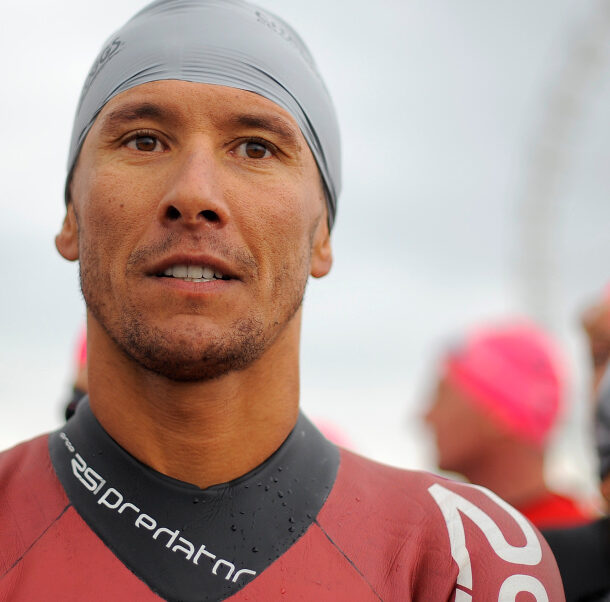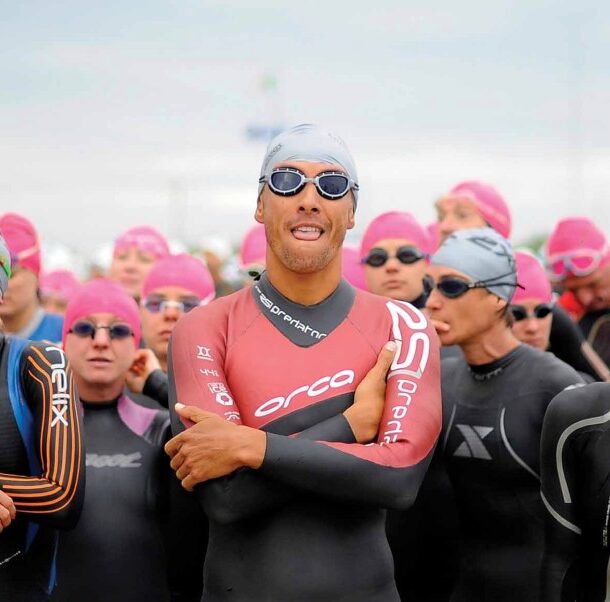
Chris McCormack believes nothing puts you more in touch with the roots of triathlon than a local race.
(Originally published in Triathlete Magazine July 2013.)
I recently celebrated my 40th birthday party in Las Vegas with a group of my best friends. One of my mates jumped up at dinner and gave a speech. It was your typical birthday speech, with lots of juicy bits aimed at embarrassing you. One of the things he mentioned struck a chord with me, and I kept thinking about it all night. We were both great high school runners, but I had caught the triathlon bug. He was envious that I seemed to be so infatuated with something.
He brought up the time he asked me, “What would you possibly do if the sport went away?” Back then triathlon wasn’t an established sport with a certain future. It wasn’t in the Olympic Games, it had no international governing body and many people viewed it as a sort of sports challenge rather than anything legitimate.
I sat still as he rambled on, eager to ask him what my answer to that question was almost 25 years ago. After he finished his toast, I asked.
“You told me, ‘That day will never come!’” he said. “‘Triathlon won’t just exist—it’s only going to get bigger. Just go down to one of these races and see for yourself. The people who do this sport rock. The energy is contagious. That will never stop.’”
As I looked around at my friends in the room and people I was celebrating with, I realized that I was right. Triathlon had given me every single one of these people in my life. I thought to myself, “Man, the people in this sport really do rock!” We celebrated into the early morning with the endurance of multisport racers.
The next day I couldn’t let the thought go. I decided that I was going to enter a couple of races the following weekend for no other reason than to return to those roots and just hang with rocking people. As a professional, sometimes you get so caught up in chasing titles and major races that you go from one training plan into another goal-setting period and then another training plan that you don’t take time to enjoy why you do it in the first place.
I tried to think of the last time I got caught up in the energy of an event without wondering about how it would affect the outcome of my race. My romantic memories of triathlon as a teenager didn’t seem as romantic when I compared them to my memories of the sport today. I was annoyed at myself and frantically searched the Internet for races to do. I felt like I was 18 again.
I found two races in California that I could enter, and I slipped onto the website and paid for my entry. I wanted no fanfare or special treatment; I was simply going to go and have fun in the same way I did as a kid. Swim, bike and run as hard as I could early on a weekend morning and enjoy everything that is triathlon.
I turned up at a race in Huntington Beach, Calif., and the following day at the oldest triathlon race series in the world: Bonelli Park in L.A. A back-to-back weekend of racing, just like I would have done years ago. My motivation was old-school: just have fun and hurt myself and enjoy the people who were here to do the same thing.
It was your typical community triathlon weekend: great atmosphere, good energy, simpler staging. I was stoked to see the same good-time feel that has always been a part of triathlon. It was a surreal, awesome experience, and in my mind I checked it off again: This sport isn’t in danger of going anywhere. The people are its biggest asset, and it is still as addictive as ever. I took my time to roll down to the swim start with everyone else and just soak up the energy. I racked my bike in the middle of the transition area next to a couple of beach cruisers and on a rack with three first-time triathletes. It made for an awesome transition picture. It was seriously cool, and I could not get the smile off my face from the minute the gun went off until I crossed the line. It was awesome.
I spent my time after the race hanging out with many of the first-timers who raced and I listened to their stories. There was no talk of drafting calls or aero helmets, no mention of power numbers or compression garments. It was the old, simple stuff of how tough the run was and how great the course was in their local town. It was unbelievably refreshing. I have not enjoyed a triathlon series like that in years.
For many of us who have been doing triathlon a long time, we can sometimes neglect these races and justify that decision around the basis of “I am training for something bigger.” I honestly don’t think there is anything much “bigger” than these races. No Ironman, no marquee race I have done will truly match the enthusiasm and the energy of a local community triathlon. It is amazing to feel that again, and you can only connect and find that in races like this. They are the soul of the sport, and the race directors who continue to put on races in their local towns should be applauded.
This sport is only going to get bigger. I got that right more than 20 years ago. To everyone I met in California, it was awesome to share the course with you all.
I am sure if I continue to accumulate good friendships with the people in this sport in the same way I have thus far, that 50th birthday celebration will be one not to miss.
Philosophy
“Great things happen to people who make great things happen.”
Navigate
chris@macca.com
Terms & Conditions
Privacy Policy

